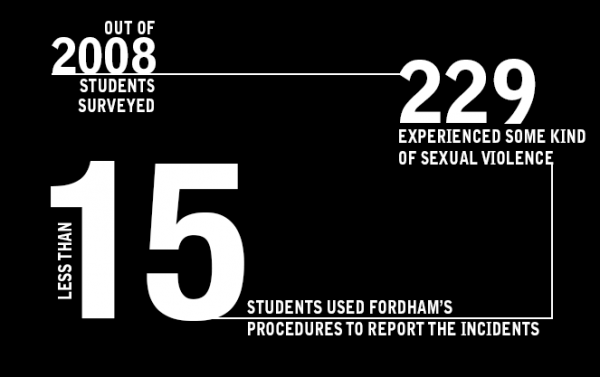Fordham Released Sexual Assault Climate Data
May 10, 2016
Fordham University released a 138-page document detailing the results of a survey regarding the climate of sexual assault on campus. 2,008 graduates and undergraduates of the 15,549 students to whom it was made available via email responded to the voluntary and anonymous survey, which was conducted last spring.
229 students, or 11.4 percent, indicated that they experienced at least one of the following since their time at Fordham: sexual contact by force or threats; an unsuccessful attempt at sexual contact by force or threats; suspected or were sure that someone had sexual contact with them when they were unable to consent or stop what was happening because they were either passed out, drugged, incapacitated or asleep.
About 94 percent of students did not use the University’s procedures to report the incidents. However, approximately 85 percent of students report believing that the University would take the assault seriously. When asked what the University is doing to encourage students to report incidents, Dean of Students at Lincoln Center Keith Eldredge said, “The more students understand the process and how much control they have in the process, I think the more confident they can feel coming forward, so continuing to expand what we are already doing.”
Title 9 Coordinator Anastasia Coleman speculates that some of the people not reporting to the University may have experienced the assault off-campus. “I think we have been raising awareness that we want to and will support any student, regardless of where an incident takes place, even if the aggressor is not affiliated with Fordham in any way. We want to help all students who could be struggling,” she said. “We want to assist with any issue that’s affecting the student here at Fordham.”
98 percent of traditional undergraduates reported experiencing unwanted sexual contact after having consumed alcohol. This finding did not come as a surprise to administrators or students.
“In no way do we think that that is the person’s fault,” Eldredge said. “Our overall substance abuse approach at the University is harm reduction.”
“It’s more education that when you use substances, bad things can happen ranging from bad grades to sexual assault,” he continued. “Alcohol can make the interactions much less clear when we talk about affirmative consent. Alcohol impairs your judgement and your ability to communicate.”
Leighton Magoon, United Student Government (USG) President and Fordham College at Lincoln Center (FCLC) ’17, said, “We can’t discourage young women and men from going to parties.”
“We really need to get to the root cause of why this happens at parties and that people do this under the influence,” he continued. “But just saying don’t drink isn’t the solution.”
On a scale of 1-4 (1 being not likely and 4 being extremely likely), over 20 percent of students responded that they were not likely (3 or lower) “to decide not to have sex with a partner when they were drunk.” Administrators and students believe this response relates to hook-up culture.
“I think for a lot of students …decision making around intimacy is influenced by alcohol,” Eldredge stated. “For many students, in order to engage in sexual behavior they feel like they need to or want to consume alcohol. And it can be difficult to determine the difference between drunk and incapacitated.”
Definitions of words like drunk, rape and crisis were intentionally left out so that students could bring their understanding to the survey, according to Coleman and Eldredge.
“I think a lot of students think everyone has sex. It’s not that big of a deal to have sex when you’re drunk,” Nopel Wong, FCLC ’18, said.
[quote_center]Over 20 percent of students on the same scale of 1-4 reported not likely (3 or lower) to ask for verbal consent from their intimate partner.[/quote_center]
Over 20 percent of students on the same scale of 1-4 reported not likely (3 or lower) to ask for verbal consent from their intimate partner.
“I don’t want to make the assumption but I think that a lot of people buy into this hook-up culture and that asking someone for consent seems very formal,” Wong said. “But, having never been in a situation like that, I can’t really judge.”
According to the survey, about 89 percent of the individuals that committed the perceived assaults were male. The University has decided not to release the breakdown of the reported victims.
“In case a certain gender isn’t highly represented, we don’t want any person reporting it to feel isolated. We don’t want people to self-blame, or believe they may have caused what had happened to them.” Coleman said.
Both Wong and Jason Irukulapati, FCLC ’18 appreciate the data being shared with students. “It’s a good thing that they did. I think the fact that the University is being open about it is really good,” Irukulapati said.
As for the data itself, Wong said, “It makes me realize that Fordham is not in this perfect little bubble and there are things that are unknown to us and intentions of our classmates that [aren’t] explicit.”
Going forward, both Eldredge and Coleman want to continue to promote information about how to respond to sexual assault and bystander intervention.
“We want to stop every form of sexual misconduct,” Coleman said regarding this aim. “And we want students to have more of an active role in helping, and in being good bystanders. We truly want to change the culture so that we are not only talking about how we respond to incidents, but about how to prevent incidents before they occur, and how to be more involved bystanders for one another. We want to emphasize that we are here to take care of each other.”
“If students do have ideas for programs, critical feedback about what we’ve been doing, we’d love to hear that,” Eldredge said.
Students can make suggestions or ask questions to [email protected] or [email protected].













